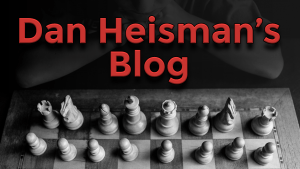
The Best Of The Old And New Schools
Occasionally I run into players who think that Bobby Fischer "did it all by himself." I.e. he locked himself in his room, studied chess until he was world class, and then burst onto the tournament scene.
Uh, no.
Every day after school, Bobby would go to the Hawthorne Chess Club. That was the name NM John Collins gave to the group that met at his home. As Collins detailed in his book My Seven Chess Prodigies, this group included several strong GMs, including Fischer, the Byrne brothers, and William Lombardy. Around the time Fischer was hanging out, Lombardy was also a regular at Hawthorne. He was in the midst of winning the World Junior Chess Championship. Meanwhile Fischer was going to the Manhattan Chess Club and playing in every over-the-board event he could up and down the East Coast.

Fischer and Lombardy analyzing at NM Jack Collins' home.
In other words, Fischer was doing what nearly every good chess player has always done: hanging out with very good players, playing and learning from them (getting feedback), and playing in as many slow chess tournaments as possible. Every strong player I know competed in strong over-the-board events for years before becoming a titled player.
OK, these days the situation is somewhat different. You can play slow games all year on the internet (see our Chess.com group, the Dan Heisman Learning Center), and we have computer engines you can download for free (e.g. Stockfish) that play hundreds of points stronger than World Champion Magnus Carlsen. They can be invaluable tools to review your games.

You can even use Stockfish for free in the new Chess.com analysis board!
So is the Fischer/old-school paradigm for becoming a strong player completely outdated?
Some aspects are, but the main aspects are not.
There is no doubt that strong chess engines and other computer tools have made the lock-yourself-in-the-closet argument stronger. There are so many tools and websites to enhance all aspects of an aspiring player's game that I can hardly make a dent in the list by naming some. Here at Chess.com, we have many wonderful built-in tools and videos. Well-established chess softwares like ChessBase and Chess Openings Wizard (formerly Bookup) have proven track records for helping even the strongest players.
But the presence of all these wonderful and helpful tools doesn't make computer-only learning optimal.
Proponents of the lock-yourself-in-the-closet approach have often stated something to the effect of:
"If I have an engine rated 3300 to review my game or an opening with me, why would I need a strong player or instructor to help me?"
I think I answered this question extensively in my Chess.com article "In Defense Of Chess Instruction." This article evoked some strong comments of both sides.
It's true that engines will spot tactics better than any human, and it's also true that tactics/safety is the single biggest component of chess strength. But here are just a few of the important questions an engine can't help answer:

Computers aren't great at everything. E.g. pugilism.
- You are playing too fast (or too slow).
- You are not recognizing critical positions and devoting the proper resources to them.
- Your thought process is inefficient.
- You are not finding all possible candidate moves.
- You are looking deep before you are looking wide.
- You don't understand how to play this type of position.
- You don't understand the concept of breaks (or other important ideas).
- You are playing the wrong type of opponents.
- You are playing time controls that don't optimize improvement.
- You are making visualization errors in analysis.
- You are not playing toward the imbalances in the position.
- You don't understand WHY you made that tactical mistake.
- You are spending too much time trying to find tactics that win material and not nearly enough time trying to prevent your opponent's tactics.
- You are not looking up your opening moves after the game.
The list goes on and on, but you get the idea. Improvement is not optimized by simply examining engine analysis, even if you are really proficient at interpreting the engine output. That kind of passive feedback has stringent limits. Imagine how much less you would learn in school if teachers never reviewed your homework, did not return quizzes and tests, and never critiqued your work. Feedback is vital for any efficient improvement plan.

That's why I suggest that the number one improvement idea is to hang out with good players; analyze, play, and review games and positions with them. Let them critique your play. In other words, learn just like Fischer did at Collins' home.
I understand that not everyone has a good chess club (or strong friend) nearby where they can easily do this, but if you have access, it's the best resource. Here's where the computer can offer something other than just a strong engine: A place like Chess.com offers access to many strong players who would be willing to play you online. There are even stronger ones who offer instruction if you so desire.
If you augment your online games, no matter your opponents' strength, with post-mortem analysis (in the chat, or possibly via phone or Skype) so much the better. One thing I have found from giving private lessons to about 1,000 players over the past 20 years is that the stronger the opponent, the more likely they understand the importance of post-mortem analysis. Assuming they have time, they will often review the game with you. They know it helped them, and most are willing to help you, too.
Even world champs engage in post-mortems.
By doing the above, you are at least emulating online some of the best aspects of "live" slow play. It may not be as efficient, but it's better than studying in isolation.
In summary, I heartily recommend using all of the best computer-based improvement tools you can find or afford. However, these tools should augment your improvement program, not be its basis.
All of Dan's Get Better at Chess for Everyone columns can be found on his website.
In addition, Dan's many other Chess.com articles and blogs can be found here.







